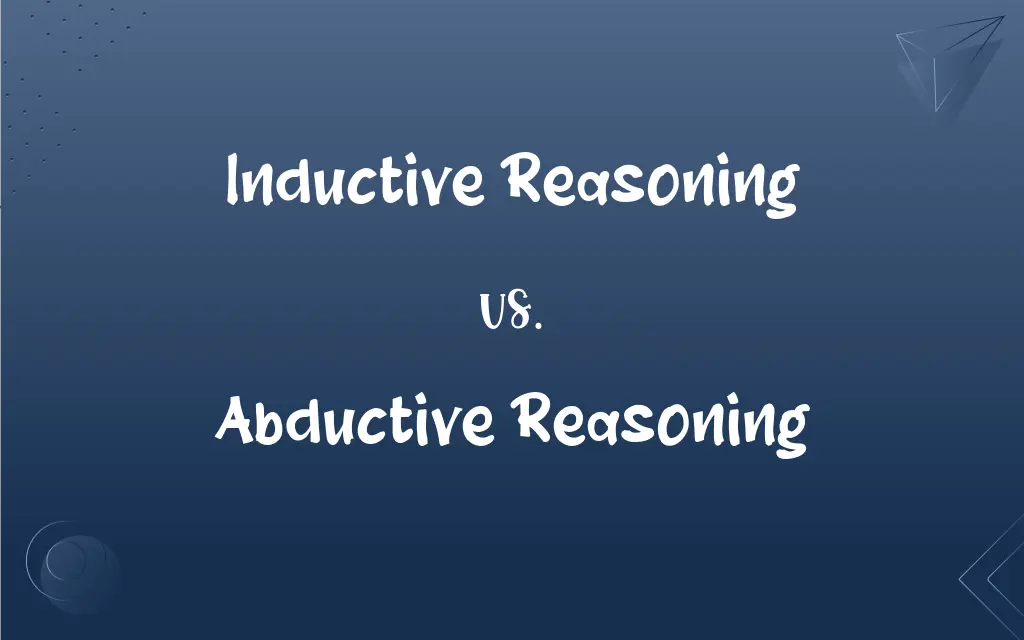Inductive Reasoning vs. Abductive Reasoning: What's the Difference?
Edited by Aimie Carlson || By Janet White || Published on December 27, 2023
Inductive reasoning involves drawing general conclusions from specific observations, while abductive reasoning is about forming a likely explanation based on limited information.

Key Differences
Inductive reasoning is a method where conclusions are drawn from observing patterns, trends, or regularities. It starts with specific observations and builds up to a general conclusion or theory. In contrast, abductive reasoning begins with an incomplete set of observations and proceeds to the likeliest possible explanation for the group of observations. It's often referred to as an "educated guess."
In inductive reasoning, the conclusions drawn are probabilistic, meaning they can suggest likelihood but not certainty. This form of reasoning is common in science where experiments and observations lead to theories. Abductive reasoning, however, is more about hypothesis generation, often used in diagnostic processes, both in medicine and in everyday problem-solving, where quick, plausible conclusions are required based on limited evidence.
Inductive reasoning is incremental and cumulative; it builds on multiple pieces of evidence to support a general conclusion. It's a bottom-up approach: starting from specific data to broader generalizations. Abductive reasoning, however, often works in a top-down manner. It starts with an observation and then seeks to find the simplest and most likely explanation.
An example of inductive reasoning is observing that the sun rises every morning and thus concluding that the sun will rise every day. For abductive reasoning, if you hear hooves clatter, you might abductively reason that a horse is approaching, not a zebra, based on the likeliest scenario in your context.
Inductive reasoning is often used to formulate laws and principles based on observed phenomena, whereas abductive reasoning is more speculative, used to quickly form hypotheses that require further testing and validation.
ADVERTISEMENT
Comparison Chart
Basis of Reasoning
Specific observations leading to general conclusions
Limited observations leading to the likeliest explanation
Nature of Conclusions
Probabilistic and general
Speculative and hypothesis-generating
Approach
Bottom-up (specific to general)
Top-down (general to specific)
Common Use
Formulating theories and generalizations
Generating hypotheses and initial explanations
Example
Observing all observed swans are white and concluding all swans are white
Hearing hoofbeats and guessing a horse is approaching, not a zebra
ADVERTISEMENT
Inductive Reasoning and Abductive Reasoning Definitions
Inductive Reasoning
It's reasoning from detailed facts to general principles.
Seeing every sunrise leads to believing the sun always rises.
Abductive Reasoning
It focuses on creating hypotheses that explain observed phenomena.
Noticing a person sneezing and coughing, hypothesizing they have a cold.
Inductive Reasoning
Inductive reasoning involves making broad generalizations from specific cases.
Noting all the apples you see are red and concluding all apples are red.
Abductive Reasoning
Abductive reasoning is about finding the simplest and most likely explanation.
Observing someone yawning and inferring they are tired.
Inductive Reasoning
It uses particular instances to infer general laws or principles.
After observing several instances of friendly dogs, concluding all dogs are friendly.
Abductive Reasoning
Abductive reasoning involves choosing the most plausible theory with limited data.
Hearing a loud noise at night and guessing it's fireworks on a holiday.
Inductive Reasoning
Inductive reasoning is creating a theory based on observed patterns.
Noticing that stress often precedes a headache and theorizing stress causes headaches.
Abductive Reasoning
Abductive reasoning is forming a likely explanation from incomplete information.
If the garden is wet, it probably rained last night.
Inductive Reasoning
Inductive reasoning draws generalizations from specific observations.
Observing birds fly and concluding that all birds can fly.
Abductive Reasoning
It's about making an educated guess based on the evidence at hand.
Seeing a closed store sign and deducing the store is closed.
FAQs
How does inductive reasoning work?
It observes specific instances and generalizes them into a broader theory.
Is inductive reasoning always accurate?
Not always, as it's probabilistic and based on observed instances.
What is inductive reasoning?
It's reasoning from specific cases to general principles.
What is abductive reasoning?
It's forming the most plausible explanation from incomplete information.
How reliable is abductive reasoning?
It's useful for initial hypotheses but requires further testing.
Can abductive reasoning lead to false conclusions?
Yes, because it often works with limited information and best guesses.
What's a key characteristic of abductive reasoning?
Its focus on finding the simplest and most likely explanation.
How does abductive reasoning differ from guessing?
It's an educated guess based on available evidence, not just chance.
What's the main use of abductive reasoning?
It's mainly used for hypothesis generation and initial explanations.
Can inductive reasoning predict future events?
It can suggest possibilities, but not with absolute certainty.
Where is inductive reasoning commonly used?
In science for theory formation and generalization.
Does inductive reasoning require a large amount of data?
More data improves its reliability, but it's not always required.
What is an example of inductive reasoning in science?
Observing various chemical reactions and forming a related theory.
How does abductive reasoning help in diagnostics?
It helps form initial hypotheses about a condition based on symptoms.
Does inductive reasoning always start with observations?
Typically, yes, it starts with specific observations.
Is abductive reasoning used in criminal investigations?
Yes, it's used to form hypotheses about what might have happened.
Is abductive reasoning used in everyday life?
Yes, in common problem-solving and quick decision-making.
Can inductive reasoning be applied to all types of problems?
It's most effective in problems where patterns or trends are observable.
Can inductive reasoning lead to new discoveries?
Yes, it can lead to new theories or principles.
Can abductive reasoning be used in scientific research?
Yes, for forming initial hypotheses that can be later tested.
About Author
Written by
Janet WhiteJanet White has been an esteemed writer and blogger for Difference Wiki. Holding a Master's degree in Science and Medical Journalism from the prestigious Boston University, she has consistently demonstrated her expertise and passion for her field. When she's not immersed in her work, Janet relishes her time exercising, delving into a good book, and cherishing moments with friends and family.
Edited by
Aimie CarlsonAimie Carlson, holding a master's degree in English literature, is a fervent English language enthusiast. She lends her writing talents to Difference Wiki, a prominent website that specializes in comparisons, offering readers insightful analyses that both captivate and inform.






































































